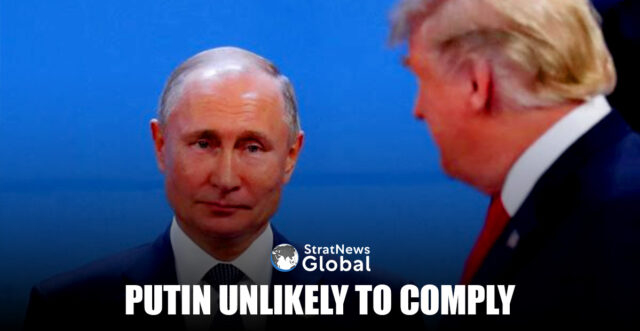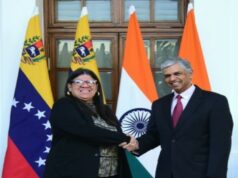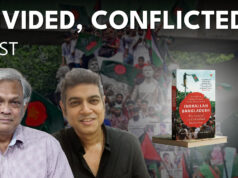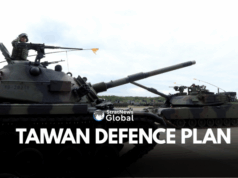Russian President Vladimir Putin is not expected to comply with a sanctions ultimatum set to expire this Friday from U.S. President Donald Trump, and continues to aim for the full capture of four Ukrainian regions, according to sources.
Trump has threatened to hit Russia with new sanctions and impose 100% tariffs on countries that buy its oil – of which the biggest are China and India – unless Putin agrees to a ceasefire in Russia’s war in Ukraine.
Putin’s determination to keep going is prompted by his belief that Russia is winning and by scepticism that yet more U.S. sanctions will have much of an impact after successive waves of economic penalties during 3-1/2 years of war, according to three sources familiar with discussions in the Kremlin.
The Russian leader does not want to anger Trump, and he realises that he may be spurning a chance to improve relations with Washington and the West, but his war goals take precedence, two of the sources said.
Putin’s goal is to fully capture the Ukrainian regions of Donetsk, Luhansk, Zaporizhzhia and Kherson, which Russia has claimed as its own, and then to talk about a peace agreement, one of the sources said.
“If Putin were able to fully occupy those four regions which he has claimed for Russia he could claim that his war in Ukraine had reached his objectives,” said James Rodgers, author of the forthcoming book “The Return of Russia”.
Russia-Ukraine Talks
The current talks process, in which Russian and Ukrainian negotiators have met three times since May, was an attempt by Moscow to convince Trump that Putin was not rejecting peace, the first source said, adding that the talks were devoid of real substance apart from discussions on humanitarian exchanges.
Russia says it is serious about agreeing a long-term peace in the negotiations but that the process is complicated because the two sides’ stances are so far apart. Putin last week described the talks as positive.
Moscow’s stated demands include a full Ukrainian withdrawal from the four regions and acceptance by Kyiv of neutral status and limits on the size of its military – demands rejected by Ukraine.
In a sign that there may yet be an opportunity to strike a deal before the deadline, Trump’s special envoy Steve Witkoff is expected to visit Russia this week, following an escalation in rhetoric between Trump and Moscow over risks of nuclear war. On Monday, Russia said it was no longer bound by a moratorium on short- and medium-range nuclear missiles.
Trump, who in the past has praised Putin and held out the prospect of lucrative business deals between their two countries, has lately expressed growing impatience with the Russian president. He has complained about what he called Putin’s “bullshit” and described Russia’s relentless bombing of Kyiv and other Ukrainian cities as “disgusting”.
The Kremlin has said it noted Trump’s statements but it has declined to respond to them.
Ukrainian Prime Minister Yulia Svyrydenko last week called on the world to respond with “maximum pressure” after the worst Russian air strike of the year killed 31 people in Kyiv, including five children, in what she called Russia’s response to Trump’s deadline.
“President Trump wants to stop the killing, which is why he is selling American-made weapons to NATO members and threatening Putin with biting tariffs and sanctions if he does not agree to a ceasefire,” White House spokeswoman Anna Kelly said in response to a request for comment.
Forces Advance
The first source said Putin was privately concerned about the recent deterioration of U.S. ties. Putin still retains the hope that Russia can again befriend America and trade with the West, and “he is worried” about Trump’s irritation, this person said.
But with Moscow’s forces advancing on the battlefield and Ukraine under heavy military pressure, Putin does not believe now is the time to end the war, the source said, adding that neither the Russian people nor the army would understand if he stops now.
Rodgers, the author, said Putin has invested his political reputation and legacy in the war in Ukraine.
“We know from his previous writings and statements that he sees himself as part of a strong tradition of standing up to the West and the rest of world to defend Russia’s interests,” he said.
The Kremlin leader values the relationship with Trump and does not want to anger him, however, “he simply has a top priority – Putin cannot afford to end the war just because Trump wants it,” the second Russian source said.
A third person familiar with Kremlin thinking also said Russia wanted to take all four regions and did not see the logic in stopping at a time of battlefield gains during Russia’s summer offensive.
Ukraine has suffered some of its biggest territorial losses of 2025 in the past three months, including 502 square kilometres in July, according to Black Bird Group, a Finland-based military analysis centre. In total, Russia has occupied around a fifth of Ukraine.
Russia’s military General Staff has told Putin that the Ukrainian front will crumble in two or three months, the first person said.
However, Russia’s recent gains remain relatively minor in purely territorial terms, with only 5,000 square kilometres (1,930 square miles) of Ukraine taken since the start of last year, less than 1% of the country’s overall territory, according to a June report from the Center for Strategic and International Studies, a Washington-based think tank.
Ukrainian and Western military sources, acknowledge that Russia is making gains, but only gradually and with heavy casualties. Russian war bloggers say Moscow’s forces have been bogged down during its current summer offensive in areas where the terrain and dense urban landscape favoured Ukraine, but assess that other areas should be faster to take.
‘He’s Made Threats Before’
Trump’s sanctions threat was “painful and unpleasant,” but not a catastrophe, the second source said. The third source said there was a feeling in Moscow that “there’s not much more that they can do to us”.
It was also not clear if Trump would follow through on his ultimatum, this person said, adding that “he’s made threats before” and then not acted, or changed his mind.
The source also said it was hard to imagine that China would stop buying Russian oil on instructions from Trump, and that his actions risked backfiring by driving oil prices higher.
As a consequence of previous rounds of sanctions, Russian oil and gas exporters have taken big hits to their revenues, and foreign direct investment in the country fell by 63% last year, according to U.N. trade data. Around $300 billion of central bank assets have been frozen in foreign jurisdictions.
But Russia’s ability to wage war has been unimpeded, thanks in part to ammunition supplies from North Korea and imports from China of dual-use components that have sustained a massive rise in weapons production. The Kremlin has repeatedly said that Russia has some “immunity” to sanctions.
Trump has acknowledged Russia’s skill in skirting the measures. “They’re wily characters and they’re pretty good at avoiding sanctions, so we’ll see what happens,” he told reporters at the weekend, when asked what his response would be if Russia did not agree to a ceasefire.
The first Russian source noted that Putin, in pursuing the conflict, was turning his back on a U.S. offer made in March that Washington, in return for his agreement to a full ceasefire, would remove U.S. sanctions, recognise Russian possession of Crimea – annexed from Ukraine in 2014 – and acknowledge de facto Russian control of the territory captured by its forces since 2022.
The source called the offer a “fantastic chance,” but said stopping a war was much more difficult than starting it.
(With inputs from Reuters)





